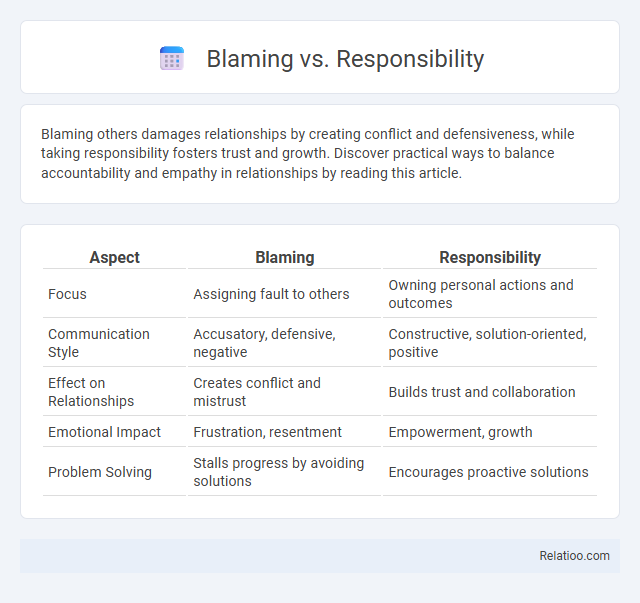Blaming others damages relationships by creating conflict and defensiveness, while taking responsibility fosters trust and growth. Discover practical ways to balance accountability and empathy in relationships by reading this article.
Table of Comparison
| Aspect | Blaming | Responsibility |
|---|---|---|
| Focus | Assigning fault to others | Owning personal actions and outcomes |
| Communication Style | Accusatory, defensive, negative | Constructive, solution-oriented, positive |
| Effect on Relationships | Creates conflict and mistrust | Builds trust and collaboration |
| Emotional Impact | Frustration, resentment | Empowerment, growth |
| Problem Solving | Stalls progress by avoiding solutions | Encourages proactive solutions |
Understanding Blame and Responsibility
Understanding blame involves recognizing it as an emotional response often tied to assigning fault, while responsibility pertains to the duty of managing actions and outcomes. Differentiating blame from responsibility enables healthier accountability by focusing on constructive problem-solving rather than punitive judgment. Emphasizing responsibility promotes growth and learning, whereas blame can lead to defensiveness and hinder resolution.
Key Differences Between Blaming and Taking Responsibility
Blaming involves shifting fault onto others, often to avoid accountability, whereas taking responsibility means acknowledging one's role and actively addressing the issue. The key difference lies in mindset: blaming creates a barrier to problem-solving, while responsibility fosters growth and constructive change. Embracing responsibility enhances personal and professional development by promoting transparency and trust.
The Psychology Behind Blame
Understanding the psychology behind blame reveals that blaming others often serves as a defense mechanism to protect your ego and avoid uncomfortable feelings of guilt or failure. Taking responsibility involves acknowledging your role in a situation, which fosters personal growth and emotional resilience. The distinction between blaming and responsibility lies in mindset: blaming externalizes fault, while responsibility internalizes accountability to promote problem-solving and self-improvement.
The Power of Personal Responsibility
Taking personal responsibility empowers you to regain control over your actions and decisions, fostering growth and resilience. Blaming others often leads to stagnation and a loss of autonomy, whereas embracing responsibility drives problem-solving and accountability. Understanding this distinction highlights the power within your choices to shape outcomes and improve your life.
Effects of Blaming on Relationships
Blaming creates a toxic environment that damages trust and intimacy in relationships by fostering defensiveness and resentment. Your ability to communicate openly diminishes, leading to misunderstandings and emotional distance. Taking responsibility instead encourages empathy and cooperation, which strengthens relational bonds and promotes healthy conflict resolution.
How Responsibility Fosters Growth
Taking responsibility rather than blaming others encourages personal growth by promoting accountability and self-reflection. When individuals accept responsibility, they identify areas for improvement and develop problem-solving skills, leading to increased resilience and competence. This proactive mindset fosters a growth-oriented environment essential for continuous learning and development.
Overcoming the Blame Game
Overcoming the blame game requires shifting your focus from blaming others to taking responsibility for your actions and outcomes. Embracing responsibility fosters personal growth and accountability, promoting constructive problem-solving rather than conflict escalation. Understanding the difference between blame and responsibility empowers you to create positive change and improve relationships effectively.
Practical Steps to Shift from Blame to Responsibility
Shifting from blame to responsibility requires practical steps such as fostering self-awareness to recognize emotional triggers and reframing negative thoughts into constructive actions. Implementing clear communication techniques like using "I" statements helps create accountability without assigning fault. Encouraging problem-solving mindset and collaborative dialogue strengthens personal ownership and drives effective conflict resolution.
Blame Culture in Work and Society
Blame culture in work and society undermines accountability by fostering fear and deflecting responsibility, leading to decreased collaboration and innovation. Emphasizing responsibility shifts focus from punishment to learning and problem-solving, promoting a growth-oriented environment where individuals and teams can improve performance. Addressing blame culture requires leadership to model transparency and encourage open communication, ultimately transforming organizational and social dynamics.
Building a Habit of Responsibility
Building a habit of responsibility involves consistently recognizing one's role in outcomes and actively seeking solutions instead of assigning blame. Emphasizing responsibility fosters personal growth, accountability, and improved problem-solving skills, whereas blaming hinders progress and damages relationships. Cultivating this mindset requires intentional reflection, self-awareness, and a commitment to learning from mistakes to drive positive change.

Infographic: Blaming vs Responsibility
 relatioo.com
relatioo.com